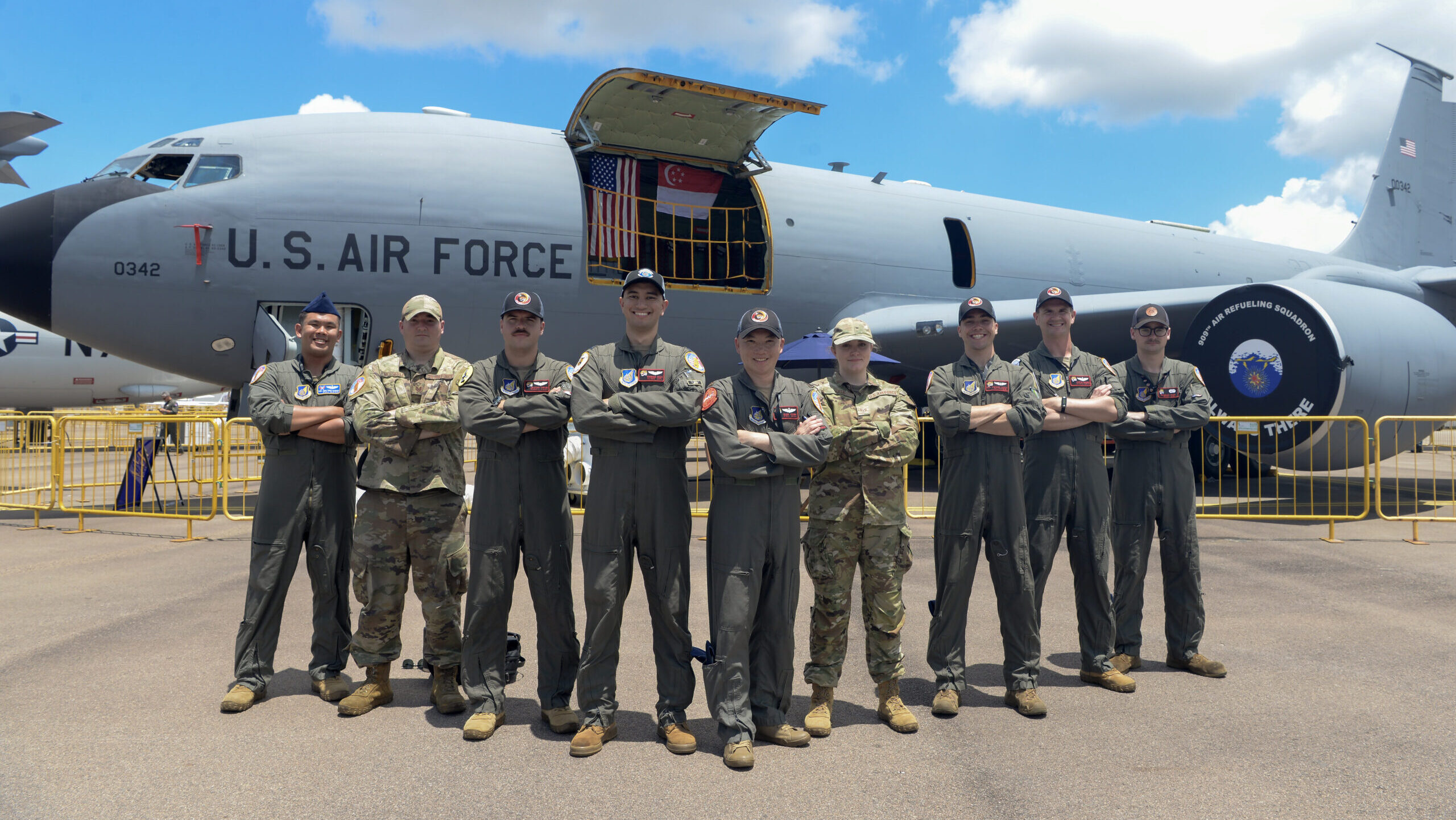
U.S. Air Force KC-135 Stratotanker crew members stand in front of their aircraft for a group photo during the Singapore Airshpw 2024 at the Changi Airbase East, Republic of Singapore Feb. 20. (U.S. Air Force photo by TSgt Andrea Posey)
SINGAPORE AIRSHOW — Even as US Foreign Military Sales break record levels, allies and defense companies continue to press for faster approvals by the Pentagon, Intelligence Community and State Department, as well as urging greater transparency so customers know what is happening.
“When it comes to modernizing FMS, a more efficient process is key. That does not mean trying to get no’s turned to yeses. We are trying to get to the right answer faster,” Eric Fanning, CEO of Aerospace Industries Association, told Breaking Defense during this year’s Singapore Airshow. “If you are going to sell something to an ally, why not try a way to get there faster rather than frustrate them by dragging it out? If the decision is to say no, it’s best to get there faster as well.”
FMS sales in fiscal 2023 were a record $80.9 billion, up 55.9 percent from $51.9 billion in the previous fiscal year.
The quality of US relations with partners and allies and their military capabilities often depend in part on both the sale and support of US weapons and how well the sale and its attendant approvals are managed.
This is especially true these days when allies and partners, often portrayed as America’s edge in its competition with the Peoples Republic of China, want to buy a weapon system and can’t find out why it appears to be delayed, or even if it is delayed.
“You do not know where something got held up,” Fanning noted, “because the process is so opaque that it allows basically everyone to have a pocket veto option.”
The deputy director of the Defense Security Cooperation Agency, which manages the FMS process, said in an interview with Breaking Defense that DSCA knows allies and partners want answers.
“I think, partners when they’re asking for technology release, they’re looking for — even if transparency can’t be provided to them, they’re looking for clear answers in a reasonable time,” Michael Miller said during a Monday interview. Most important, his agency has combed through the system, trying to hammer out a faster, more efficient and more transparent path ahead.

AVIC (Aviation Industry Corporation of China) is the vast state-owned company that produces both commercial and military aircraft. CATIC is China’s state-owned company for the export of aerospace products. The Y-20 model represents the largest defense transport aircraft in production. (Colin Clark/Breaking Defense)
The Pentagon created a Tiger Team to look at the FMS process and released the proposed reforms in June last year.
“We examined the FMS system and all its phases. We looked at past studies, we looked at every phase of the process, case studies of systemic challenges, had engagement with industry and we talked to our partners; we fashioned a series of recommendations that follow six broad pressure points,” Miller said.
The agency “went after the hardest problem set that we could produce” to develop fixes. As a result, Miller said, “We’re far better organized through this work than we were before, in terms of rallying our implementing agency partners and the combatant commands.” Regular updates now help track a sale’s progress.
But Fanning said “process issues within the responsible agencies” remain and there is “a need for better coordination amongst the agencies.”
One set of reforms that have not received a great deal of attention is the deployment of what Miller called “the most comprehensive set of financing options available to our partners. We’ve done more competitive financing throughout the last four years than we’ve done in the previous 20.”
While predictions about a year’s sales are rarely made, Miller did say that “we continue to see strong demand. I think that’s going to continue.”






















